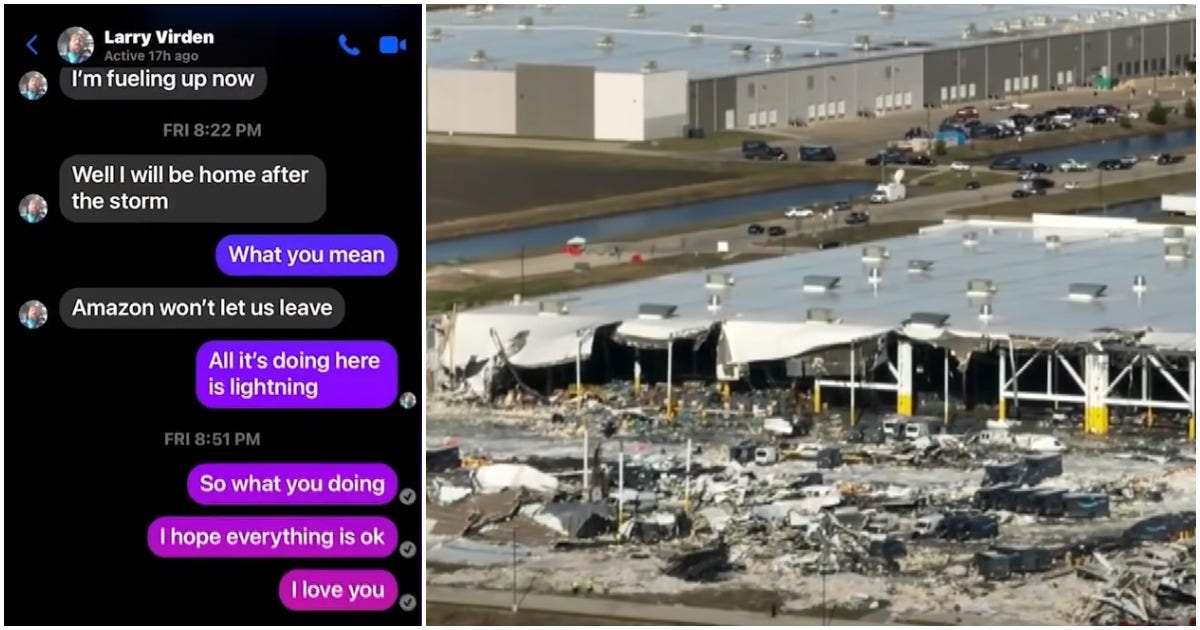It's Time to Start Counting Deaths Under Capitalism the Way We Do Under Communism
"Amazon won't let us leave." These were the last words Larry Virden communicated to his girlfriend via text message before being killed when a tornado struck his place of work, an Amazon warehouse in Edwardsville, Illinois, moments later. Virden was one of six Amazon workers to die that night.
Not far from there, in Mayfield, Kentucky, workers at a scented candle factory were threatened with termination if they went home to take shelter from the coming storms. Eight of them were killed when tornadoes ravaged the building.
Everyone acknowledges the tragedy of these 14 combined deaths, and most would agree that they were preventable. Few would go as far as to ascribe them to capitalism. But we should.
Over Thanksgiving dinner, if you're the type to pick fights with your Republican uncle, it's likely your advocacy for a modest social democratic policy like paid family leave was met with something like "You do know Communism killed 100 million people, right?!"
Unfortunately, your tryptophan-addled relatives who you deal with once or twice a year aren't the only ones making this point. Op-eds abound in many a mainstream outlet echoing the same message, which perpetuates peoples' tendencies to attribute deaths under communism to communism.
This would be fair enough if capitalism were similarly held to account for its own exorbitant death toll - but it isn't. By the same logic applied to assessing the harm that communism has wrought upon the human race, the combined 14 people who died in Mayfield and Edwardsville on the night the tornadoes struck died under capitalism and because of capitalism.
Amazon's rules against cell phones on the floor kept workers unaware of the developing storm system until it was too late. Mayfield's candle factory insisted on maintaining its 24/7 operations to keep up with holiday demand, and, once again, threatened to fire anyone who went home before the end of their shift.
Additionally, a text exchange verified by local St. Louis area news shows a driver alerting his dispatcher to tornado sirens in his area. When he asked if he could return to the warehouse for shelter, dispatch responded, "If you decide to return with your packages, it will be viewed as you refusing your route, which will ultimately end with you not having a job come tomorrow morning." Thankfully this particular incident didn't result in death as the former two did, but it very well could have.
Of course, these decisions to push forward with business as usual even in the face of a deadly storm were made for no other reason but to maximize efficiency, productivity, and profit. Therefore, it is reasonable to attribute these deaths to the capitalist system that not only permits, but encourages, employers to maximize worker output under any all circumstances, often making little to no exceptions to account for their safety.
We can look to history to further compare the death counts of capitalism vs. communism (the Transatlantic slave trade and the European conquest of the Americas alone both boost capitalism's total well into the millions), but the current pandemic itself offers ample perspective on the question.
The United States, the "richest" nation in the world and the only developed country on earth without a universal government-guaranteed healthcare system, leads the world in coronavirus deaths. And it isn't even close. At this writing, the U.S. death count stands just above 800,000. In second place, with just over 600,000 covid deaths, is Brazil, which has been governed by far-right president Jair Bolsonaro since 2018.
To go back slightly further, The New York Times published a review of a book entitled Deaths of Despair and the Future of Capitalism on March 6, 2020, a week before the initial covid lockdown. It showed soaring rates of these "deaths of despair" over the past three decades among non-college educated workers, who struggle disproportionately with alcoholism, chronic pain, unhappiness, and, of course, inadequate healthcare coverage.
These are the very kinds of people who found themselves held hostage at Amazon's warehouse and in the Mayfield candle factory this past week, even as tornado sirens sounded all around them.
Inevitably, some will argue that these recent examples of the Amazon warehouse and candle factory collapses are not problems of capitalism itself, but rather are the results of greed and recklessness on the parts of individual companies. This sounds awfully similar the argument that "true" communism has never been tried and can therefore not be fairly blamed for fiascos such as the famines under Stalin.
But if the mass starvation that resulted from forcing peasant farmers to collectivize against their will and ability can be blamed on communism, then capitalism ought to be the logical culprit when workers are forced to remain on the job during a tornado warning in order to keep the product going out and the money coming in, safety concerns be damned.
If we're going to seriously evaluate these competing economic ideologies, it's long past time we start judging them by the same standards and using the same criteria. The simple declaration that "communism killed 100 million people" tacitly assumes that capitalism has killed no one.
This obviously isn't even close to being the case, and so it's about time we start more fairly keeping score.




